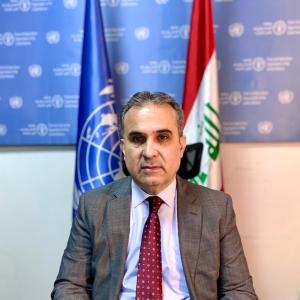Innovative Solutions by FAO and Partners for more resilient communities in Southern Iraq
29 April 2024

Thi Qar- Al-Chibayish , Iraq - April 29, 2024 - In a collaborative effort, the Food and Agriculture Organization (FAO), alongside its esteemed partners, is spearheading a transformative initiative aimed at bolstering resilience and sustainability within communities and safeguarding the environment in southern Iraq.
Initiated with financial support from the European Union through the ‘ Restoration and Strengthening the Resilience of Agri-Food Systems in Southern Iraq `project and now complemented by several other projects funded by the Swedish International Development Cooperation Agency (SIDA), Global Affairs Canada (GAC), the Norwegian government, and in collaboration with Iraqi Ministries of Agriculture, Water Resources, Environment and local authorities, FAO's interventions have played a crucial role in delivering vital assistance to rural communities and buffalo breeders.
The tangible impact of the efforts made has been remarkable, emphasizing the importance of resilience and sustainability in community development. Such successes serve as a testament to the power of collaborative action and underscore the need for continued support to strengthen these vital lifelines.
Moving forward, FAO is doubling down on its commitment to innovation and sustainability, with a strategic focus on water and energy uses. Through synergistic partnerships with governmental entities such as the Ministry of Agriculture, the Ministry of Water Resources, the Ministry of Environment, local authorities and donors, FAO is poised to introduce much-needed modern climate resilient practices to sustain the region's landscape and soils.
At the heart of this initiative is the introduction of a home solar water desalination unit. This unit has been meticulously designed and assembled by the organisation's team of experts. Solar panels provide electricity for the Home Water Desalination Unit, generating clean energy. In addition, they provide television and satellite systems for viewing satellite channels, while also serving as a reliable source of energy for multiple household uses.
The impact of this endeavor goes beyond simply providing more luxury. By reducing the financial burdens associated with purchasing potable water and fuel to operate traditional electric power generators that pollute the environment, the cost of living for homeowners will be reduced by approximately $300 per month, which represents the expenses of purchasing fuel and clean water.
The impact of this endeavor goes far beyond mere convenience. By alleviating the financial burdens associated with purchasing potable water and fuel to run traditional polluting electricity generators. The cost of living for homeowners will be reduced by approximately $300 per month, which represents the expenses of purchasing fuel and clean water, particularly in the central marshlands within Al-Ahwar. FAO's solar-powered solutions will enable and empower families to thrive in place, rather than succumb to the pressures of harsh environmental conditions. Furthermore, this innovation will leave women within the household with less house-work burden, as well as improved hygiene.
"Building community resilience requires concerted efforts and unwavering commitment from all stakeholders," said Dr Salah El Hajj Hassan, FAO Representative in Iraq. "We are extremely grateful for the spirit of cooperation shown by our esteemed partners. Together, we are not only providing immediate relief, but also laying the foundation for long-term sustainability. As we face today's challenges, FAO remains steadfast in our mission to provide innovative and sustainable solutions that not only strengthen livelihoods, but also preserve the environment for generations to come."
This initiative represents a collaborative effort involving governmental entities, local authorities, and valued donors including the European Union, Canada, Sweden and Norway.
FAO and its partners are steadfast in their commitment to scale-up government-led efforts and foster resilient communities and perfectly aligned with several Sustainable Development Goals (SDGs), notably SDG 6 (Clean Water and Sanitation) and SDG 7 (Affordable and Clean Energy), among others. With steadfast dedication and an innovative ethos, FAO stands ready to pave the way for a brighter, more sustainable future, ensuring that no one is left behind.


He started his career in 1984, as Senior Research Assistant in the Agricultural Research and Education Centre (AREC), American University of Beirut. From 1987 to 1991, he was Coordinator of the Student Training Programme, and also Agriculture and Horticultural Teacher for the Faculty of Agriculture, at the Lebanese University.
From 1991 to 1995, he worked as Agricultural Engineer at the Ministry of Agriculture, Bekaa Regional Office, Zahlah and was then assigned to the Agricultural Research Institute in the Tal Amara station, first as Head of the Crop Production Department and subsequently in charge of the Plant Protection Laboratory. From 2002 to 2006, he was Director of the Kfardane Research Station (Agricultural Research Institute). In 2008, he became Visiting Scientist at the International Maize and Wheat Improvement Centre (CIMMYT) and Coordinator of a project with the International Centre for Atomic Energy Agency, Vienna.
In 2010, he served as Advisor to the Minister for Agriculture of Lebanon. In 2011, he became President of the Pesticide Scientific Committee, Head of the Phytoplasma Committee and Director of the Agriculture and Rural Development Programme (ARDP) (EU-funded project). From 2010 to 2013, he represented Lebanon in negotiations with EU, Egypt, Jordan and Iraq. During his career, Mr Hajj Hassan also carried out a number of other functions. He represented the Lebanese Agricultural Research Institute (LARI) in several research programmes with the International Centre for Agricultural Research in the Dry Areas (ICARDA) and the American University of Beirut. He was Coordinator of the Mashreq/Maghreb project with ICARDA, representing Lebanon in the Steering Committee, as well as being the Head of the Sugar-beet Delivery and of the Wheat Delivery Committees. For a number of years, Mr Hajj Hassan worked for the preparation of FAO TCP projects and served as the National Director of a TCP project. He joined FAO in January 2014 as FAO Representative in Yemen. Mr Hajj Hassan succeeds Mr El Zubi as FAO Representative in Iraq.


